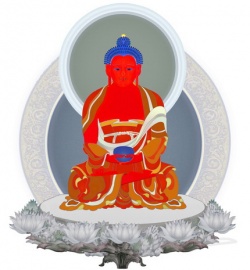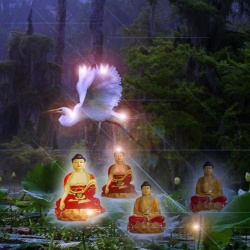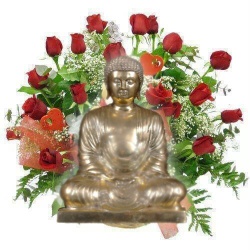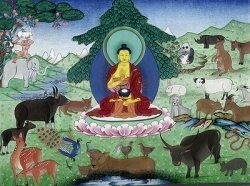Depression
Difficult Circumstances
Much of the time, a strong sense of burden in our minds determines our experience of difficult circumstances. The most skilful approach to improving our situation is to work with our minds rather than external circumstances.
Our suffering has a lot to do with where we place our mind. When we face difficult circumstances, the degree of suffering depends on how we relate to the circumstance, where we place it in our hearts and minds.
~ Ogyen Trinley Dorje, the 17th Gyalwang Karmapa
The Dalai Lama, when asked, "If you look at the depressing conditions found all over the world and the injustices that happen to people everywhere, how can you be optimistic?" thought for a second then let out a deep belly laugh, and replied, "What else would you suggest?" (quoted by Will Parrinello, producer of film, Dreaming of Tibet.)
Mild Depression
People who have not experienced the profound darkness of a mind whose home, the brain, is in a state of depletion of certain essential chemicals cannot understand how it may not even be possible for a person in that condition to help him- or herself. That state is a temporary one, and may be relieved by sleep which nine out of ten times, does "knit up the 'raveled sleeve of care" to some degree.
Once there is a glimmer of light, then calling upon Guru Rinpoche, Tara or Chenresi especially with accompanying visualization can let in more light. But also recall that, in this instance, you are using "skillful means."
Recall the fact that in Buddhism prayer plays a distinctive role. It is not a form of supplication, but a reminder of the Refuges: "Dharma-Vinaya says: We do not supplicate the Blessed One. The practice, when embodied, leads to liberation. The Blessed One taught that patience is the highest Earthly Nirvana. The Tathagata is not a god, and the Tathagata is not to be supplicated." (Ven. Dhammapiyo)
Lama Zopa, in a lecture no longer available online:
"It says in the teaching of the Wheel of Sharp Weapons that Lama Atisha received from Lama Dharmarakshita that experiences like depression are not un-causative phenomenon. They are causative phenomenon. They have causes. Even though one cannot tell based on his/her experiences what has caused a disturbance doesn't mean it has no causes. There are reasons for why these experiences happen. The cause for the depression, the reason for the depression, what makes it exist now, happened either previously in this life or in past lives. The cause happened before the result.
In the teachings of the Wheel of Sharp Weapons, the thought transformation text, it is mentioned that depression happens due to generating some karma in the past, some mistakes in the past with vows, with teachers or holy objects. It's all related to ego, the self-cherishing thought and originated by that. Cherishing the "I" is the source. It opens the door for problems, suffering, and obstacles.
Cherishing others opens the door for happiness."
Helping Yourself
One truly is the protector of oneself; who else could the protector be?
With oneself fully controlled, one gains a mastery that is hard to gain.
~ Dhammapada 160
Easy to do are things that are bad and harmful to oneself.
But exceedingly difficult to do are things that are good and beneficial.
~ Dhammapada 163
Be Your Own Therapist, Lama Thubten Yeshe, Melbourne: 1975.
THE MIRROR OF MINDFULNESS
Mindfulness is the root of the Dharma.
Mindfulness is the body of practice.
Mindfulness is the fortress of the mind.
Lack of mindfulness will allow negative forces to overcome you.
Without mindfulness you will be swept away by laziness.
Lack of mindfulness is the creator of evil deeds.
Without mindfulness and presence of mind, Nothing can be accomplished.
Lack of mindfulness piles up shit.
Without mindfulness you sleep in an ocean of piss.
Without mindfulness you are like a heartless zombie, a walking corpse.
~ Nyoshyul Khenpo, a Gelukpa teacher
Blame
Is there any benefit in persisting in the belief that someone else's action (or lack of one) is the cause of your suffering? There is a saying: "You cannot cover the surface of the earth with leather -- only the soles of your own feet."
There is no more worldly existence for the wise one who, like the earth, resents nothing, who is firm as a tall pillar and as pure as a deep pool free from mud.
~ Dhammapada 95
Overwhelmed?
Suicidal Thoughts
An experienced Buddhist practitioner will first ask, "What is there to really kill?" The desperate or profoundly sad feeling can also be used as a challenge to your skill. In a place where the means to suicide are not available to you and/or where there are others present as a kind of safeguard, consider what the implications are. Then if the feeling returns another day, you will have that memory of the experience of that incidence of mindfulness as a kind of cue to help with your commitment to life.
A beginner might consider the main Buddhist precept which is, Not to take a life. In even considering causing a death, we are disregarding the preciousness -- the opportunity -- the rarity of life. In considering such an action, we are not being mindful of the realms besides the virtual hell realm in which we may temporarily be finding ourselves, and of the nature of samsara which is founded on our ignorance of the interconnectedness of all beings.
Buddhism cannot therefore, consider that suicide is anything other than an evil action. And to do such a thing with intention will result in serious karmic consequences.
Getting Help
When you are overwhelmed by depression and despair, it is not easy to think clearly -- to be Mindful. Therefore it is very important when you find yourself thinking about the possibility of suicide, to talk to another person, preferably someone with experience in those things. In most industrialized areas of the world, there are help telephone services. At least try one of those, if you have no one to talk to in your personal circle of family or friends.
The treatment known as Cognitive Therapy is helpful because it does not focus on the past, but is logical, working through reasoning.
Plan ahead not to get caught in black holes all alone, if you think you have that tendency. Make a deal or a buddy contract with an acquaintance or friend, so that you can contact the other and they can also call you when things are not going well. This suggestion might actually work better with someone who is willing but whom you do not know too well -- that is, someone with whom you did not, and do not, have an emotional relationship.
S.A.D. or Seasonal Affective Disorder
Often, a desperate feeling will pass with a little physical exercise such as a walk outside. If you live in an area where the winters are long and dark, that can be a cause of serious depression -- it is not just a "mental thing." If there is not enough light in your environment, brightness/hours -- there are special bulbs or fixtures you can get. But if those physical adjustments do not help, or if your depression returns with some regularity, please see a health-care professional.
Shame
If the desperation is brought on by a radical change in your life, drug withdrawal, an unpleasant or frightening problem involving shame, family, money and so on, please talk to a social or psychological professional, a school advisor, or an elder in your community. There are also various support groups. It is extremely unlikely that your situation is a unique one, so do not feel shy about discussing it.
Sexual Abuse
"I am having trouble distinguishing between two things. I am one of the one-in-three Americans who have been sexually abused, and one of my most important tasks is to build a far more solid sense of self than I have ever had. At the same time I know the work of dharma of dissolving the vicious nature of ego is my ultimate task. I need some help in how to deal with the conventional and ultimate levels at the same time."
Rinpoche: "The situation you describe is one of a variety of situations that tend to destroy someone's confidence in themselves as an individual. One way to deal with that is to look directly at the situation and the attendant pain and habit of viewing yourself in a certain way. If you look at all the aspects of a situation, you will see that it is a demonstration of interdependence and of the relative coming together of different conditions. Also consider the fact that our experiences are the product of previous karma and therefore, while the experiences are brought about, they themselves are interdependent and impermanent. Then what will happen through intense analysis is that as your fixation on an imputed self lessens, you will discover an innate wisdom which will give you a confidence in yourself that not only will transcend the trauma, but that goes far beyond the confidence that it is possible to have as long as such confidence is based on a reified (solidified) self."
~ Khenpo Karthar Rinpoche. A Teaching on Interdependence and Emptiness. (17).
reified: The creation of something through labeling or naming. In other words, we are accustomed to thinking in terms of a separate entity called "self" because we label individual subjective experience, then we label it which creates in our minds (or is solidified, as the translator has chosen to say) the "fact" of Self.
More Scripture
One who drinks deep the Dhamma lives happily with a tranquil mind.
The wise one ever delights in the Dhamma made known by the Noble One (the Buddha).
~ Dhammapada 79
Through conviction one crosses over the flood.
Through heedfulness, the sea.
Through persistence one overcomes suffering and stress.
Through discernment a person is purified.
~ Sutta Nipata I, 10
Well done is that action of doing which one repents not later,
and the fruit of which, one reaps with delight and happiness.
~ Dhammapada 68
Those who mistake the unessential to be essential, and the essential to be unessential, dwelling in wrong thoughts, never arrive at the essential.
~ Dhammapada 11
Let go of the past, let go of the future,
let go of the present, and cross over to the farther shore of existence.
With mind wholly liberated,
you shall come no more to birth and death.
~ Dhammapada 348
He has broken the cycle,
attained freedom from desire.
The dried-up stream no longer flows.
The cycle, broken, no longer turns.
This, just this, is the end of misery.
~ Udana VII, 2
see also: Unhappiness







